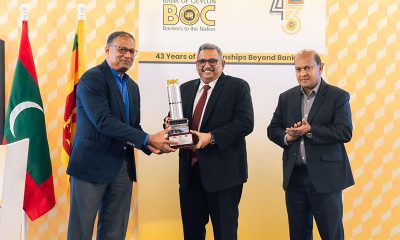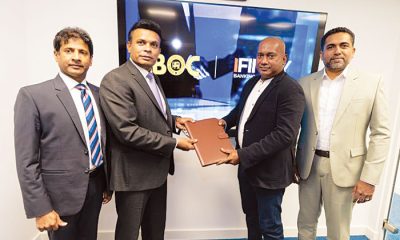Business
BOC gifts luxury house worth Rs. 30 million to grand prize winning expatriate customer

Remitting foreign currency via banking channels
Bank of Ceylon (BOC) recently concluded the latest season of its esteemed ‘Pita Pita Rata Thegi’ program with the handover of a luxurious house to the fortunate winner, marking itself as a pioneering bank to award a house under a programme designed for migrant workers.
This milestone event marks the culmination of a campaign aimed at incentivising Sri Lankan expatriates to remit their hard-earned foreign currency securely back to their families and loved ones.
The third edition of BOC’s ‘Pita Pita Rata Thegi’ promotion offered expatriates the opportunity to win valuable gifts in daily, weekly, and monthly draws, including the grand prize a house worth Rs. 30 million. With multiple chances to win, participants eagerly awaited the announcement of the lucky recipient of the coveted house.
Following a rigorous selection process, Bank of Ceylon announced K K Ruwan Chinthaka as the recipient of the grand prize; a fully furnished house valued at Rs. 30 million. The handover ceremony took place on 28 April 2024 at Millennium City – River View in Katunayake where Chinthaka received the keys to their new home.
“At Bank of Ceylon, we prioritize our customers with utmost care . Recognizing the aspirations of those working abroad to own a home, we’ve taken a special initiative to fulfill our loyal customer’s dream by gifting them a house. This embodies our commitment to realizing our customers’ aspirations, a testament to the deep appreciation we hold for their loyalty,” said Russel Fonseka, General Manager of Bank of Ceylon.
Situated in the serenic setting of Katunayake, the luxurious house promises a life of comfort and tranquillity for Chinthaka and his family. Complete with modern amenities and landscaped gardens, the house aims to tick off one of the main reasons why most Sri Lankans migrate for job opportunities overseas.
“I am truly honoured and grateful to the Bank of Ceylon for this precious gift. Winning this house is a dream come true for me and my family,” said Mr.Chinthaka.
The ‘Pita Pita Rata Thegi’ programme exemplifies Bank of Ceylon’s unwavering commitment to support Sri Lankan expatriates and their families.
The bank conducts awareness programmes in collaboration with the Sri Lanka Foreign Employment Bureau islandwide on financial management thereby cultivating the habit of saving amongst those who seek foreign employments, ultimately benefiting the individual and their beneficiaries. Further, the bank has strategically placed 35 representatives in 11 selected countries to assist Sri Lanka’s expat community in their financial requirements.
Business
Remotely conducted Business Forum in Paris attracts reputed French companies
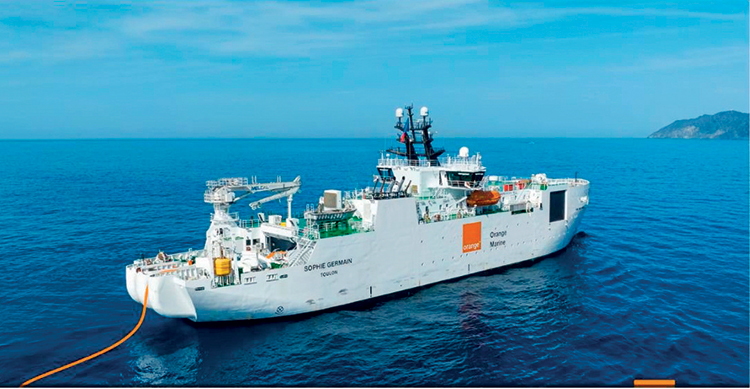
The “Sri Lanka Business Forum 2026” was organized by MEDEF International, the French Business Confederation of leading French companies, in partnership with the Embassy of Sri Lanka in France, on 30 January 2026 at the MEDEF Office in Paris. The event, which was held in hybrid format, had a solid line up of reputed French companies participating.
Delivering the keynote address, the Deputy Minister of Industry and Entrepreneurship Development of Sri Lanka Chathuranga Abeysinghe presented the Government’s policy framework and the reform agenda aimed at strengthening investor confidence, improving ease of doing business, and accelerating export-led growth. The Deputy Minister elaborated on upcoming legislative reforms, including amendments to the Minerals Act, the Colombo Port City legislative framework, implementation of the Investment Single Window, and the Government’s broader digitization drive which would contribute towards enhancing transparency and business confidence.
Highlighting Sri Lanka’s comparative advantage in the South and Southeast Asian region, the Deputy Minister emphasized France’s role as a strategic investment partner, while inviting French companies to engage with Sri Lanka. The Deputy Minister’s address was followed by a vibrant Q&A where he responded to several questions posed.
The Forum was moderated by Chairman of the France–Sri Lanka Business Council at MEDEF International and Advisor to the Chairman of the Michelin Group, Eric Le Corre.
Delivering welcome remarks, the Ambassador of Sri Lanka to France and Permanent Delegate to UNESCO Manisha Gunasekera applauded the convening of the Forum a first step in broadening and deepening the investment partnership. She appreciated the role of MEDEF in connecting reputed French companies with potential investors and partners in Sri Lanka.
The Executive Director of the Board of Investment (BOI) of Sri Lanka Priyanka Samaraweera, in her presentation detailed, inter alia, investor facilitation measures, fiscal incentives including tax holidays, tariff benefits under preferential trade agreements, and upcoming industrial zones. The BOI also invited potential French investors to participate in the upcoming Investors’ Forum scheduled to be held in Colombo on 30 March 2026.
The presentation of the CEO of Orange Marine, Didier Dillard on the company’s successful collaboration with Colombo Dockyard PLC in building their cable vessel “Sophie Germain” in 2023; and two additional vessels scheduled for delivery in 2028 and 2029, helped position Sri Lanka as an attractive and competitive investment destination.
The Embassy highlighted “Sri Lanka Expo 2026” which will be held in Colombo from 18-21 June 2026, as a key global platform for buyers and investors; and encouraged French companies to participate.
Reputed French companies, SNCF, Bureau Veritas, Carrefour, Deviseo Fret, Emovis SAS, Union de Banques Arabes et Françaises (UBAF), Michelin, and Top Tech College, participated in the Forum, thus demonstrating the interest among French cooperates in doing business with Sri Lanka. The participating companies reaffirmed that the engagement marked a first step in expanding dialogue and collaboration between France and Sri Lanka.
Senior officials of the Ministry of Industry and Entrepreneurship Development, and the Export Development Board of Sri Lanka (EDB) also participated in the forum. The Forum was organised by the Commercial Section of the Embassy led by First Secretary (Commerce) Prasadi Boomawalage, in consultation with relevant stakeholders. The success of the Forum reflects the strong commitment of the parties concerned to organise a broader, outcome-oriented engagement with the French private sector in the future.
Business
LANKATILES Celebrates the Grand Opening of Its 58th Showroom in Historic Galle
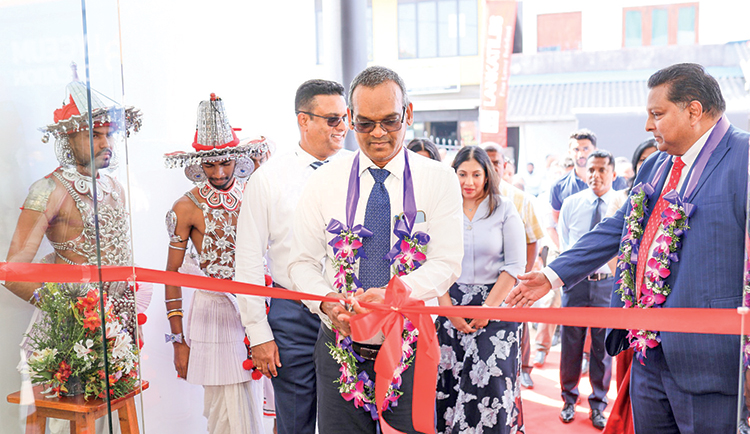
Sri Lanka’s leading tile manufacturer, LANKATILES, proudly announces the grand opening of its 58th showroom and second in the Galle located at No. 145, Matara Road, Pettigala Watta, Galle. This latest addition marks a significant milestone in LANKATILES’ continued journey of design excellence, innovation, and trusted service built over more than five decades.
Inspired by the heritage charm and timeless architecture of Galle, a UNESCO-valued destination renowned for its cultural tapestry and historic streets, the new showroom blends local architectural heritage with contemporary living needs, truly Creating Spaces That You’d Love to Live In.
“Galle’s unique character shaped by centuries of history, art and human ingenuity resonates deeply with LANKATILES’ ethos of design integrity and aesthetic depth,” said Priyantha Talwatte, Managing Director of LANKATILES. “We’re delighted to bring our design leadership and trusted product portfolio closer to the Southern market, supporting both residential aspirations and the burgeoning tourism-led growth across the region.”
Built on more than five decades of trust and excellence, LANKATILES continues to set the benchmark in tile design superiority while delivering solutions that uplift spaces with beauty and performance. The new showroom features standout products including the Majestica large-format tile collections and Mosaics, ideal for modern living spaces, luxury tourism projects, boutique hotels, and heritage restorations that demand both quality and visual impact.
As Sri Lanka’s tourism sector continues to grow, strategic destinations such as Galle play a vital role in LANKATILES’ long-term expansion strategy. The company aims to strengthen its presence in the Southern market through enhanced accessibility, tailored solutions, and meaningful collaboration with industry stakeholders.
“We recognize the indispensable role of architects, designers, contractors, and tilers in shaping inspiring spaces,” added Talwatte. “We look forward to deepening partnerships across the region celebrating creativity that transforms environments and enriches everyday living.”
The new showroom is operated by Franchise Owner Yasith Ranu Karunasekara, a Southern Province-based entrepreneur with a keen appreciation for design-driven business and customer-centric service. His local expertise and commitment to quality align strongly with the LANKATILES brand promise.
“This showroom is more than a retail space, it’s a destination where imagination meets craftsmanship,” said Karunasekara. “We’re excited to support local homeowners, hospitality developers, and professionals in redefining spaces across the Southern region.”
The LANKATILES Galle showroom officially opened on January 28, 2026, welcoming customers and industry professionals to experience the brand’s curated collections, design expertise, and innovative tile solutions.
Business
Four runs, a thousand dreams: How a small-town school bowled its way into the record books
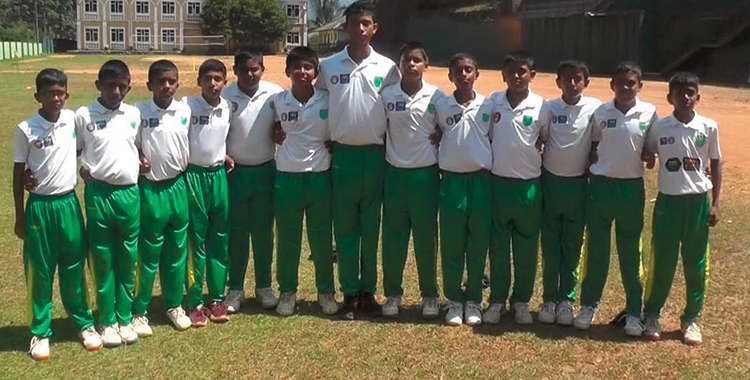
By the time the last wicket fell at Gangakanda Vidyalaya in Pelmadulla, silence briefly hung over the ground. The scoreboard told an almost unbelievable story: the Under-13 team of Kalawana National School had dismissed their opponents, Mihindu Vidyalaya, Ratnapura, for just four runs. In six overs and five balls, a group of boys from a remote corner of Sabaragamuwa had etched their names into Sri Lanka’s schools cricket record books.
The achievement soon found its way onto the official Sri Lanka Cricket Facebook page. But behind that viral moment lies a quieter, more powerful story of children who train without a proper ground, a coach who works without pay, and parents who refuse to let poverty dictate their children’s dreams.
For the boys of Kalawana National School, cricket is not played on manicured turf. There is no proper pitch. Practice nets are borrowed and returned. The few bats and pads available are worn and broken. During the rainy season, there is often nowhere to practise at all.
Yet, every evening, they turn up.
“Our children play under conditions where even the most basic facilities are lacking,” said N. V. Pushpakumara, a parent. “There is no proper playground, no pitch. Still, they keep winning. We hope the authorities will see what these children are capable of and give them the support they deserve.”
- Cricket players of Kalawana National School undergoing training amid challenges
At the centre of this effort is their coach, Chanuka Pradeep Madhushan, who joined the school in late 2021. He trains the children voluntarily, without a salary, accepting only small contributions from parents who themselves struggle to make ends meet.
“I didn’t come here expecting facilities,” he said. “I came because I saw potential. One of our boys played for the district squad in 2025. This year, our Under-13 team is doing very well. We even have a left-arm bowler who has taken 21 wickets in four matches. When you see their commitment, you want to give your best, even without pay.”
The school’s principal, Ashoka Nandasiri, speaks of cricket at Kalawana National School as a journey marked by quiet persistence. The school began leather-ball cricket in 2011. In 2016, their Under-16 team broke into the top 16 at national level. In 2025, a student was selected to the Sabaragamuwa Under-15 provincial team. And in January this year came the moment that stunned school cricket circles across the country.
- N.V. Pushpakumara, Parent
- Chanuka Pradeep Madhushanka, Cricket Coach
- Ashoka Nandasiri, Principal of Kalawana National School
“These achievements did not come easily,” the principal said. “They came through the dedication of our coach and the sacrifices made by parents. Despite many difficulties, they have kept this programme alive.”
For the boys themselves, the record is not just about four runs. It is about being seen.
“We practise with many difficulties,” said team captain P. A. Pamod Lakshan. “We don’t have proper equipment or a proper ground. When it rains, we have nowhere to go. Once, a kind uncle from Kalawana helped build us a small indoor place to practise. We are very grateful. We want to go a long way in cricket.”
In a country where cricketing dreams often begin in elite school grounds with lush pitches and modern facilities, the story of Kalawana National School stands as a reminder of how talent can grow in the most unlikely soil. These children do not ask for luxury—only for a fair chance.
Their record-breaking performance is now part of Sri Lanka’s cricketing statistics. But the deeper question remains: will their struggle also be noticed? Parents hope that this extraordinary moment will prompt sports authorities and policymakers to look beyond the usual centres of privilege and invest in rural schools where potential waits quietly, often unseen.
For the boys from Kalawana, the scoreboard has already given its verdict. Now they wait for the country to do the same.
By Upendra Priyankara Jathungama
-

 Business2 days ago
Business2 days agoZone24x7 enters 2026 with strong momentum, reinforcing its role as an enterprise AI and automation partner
-

 Business6 days ago
Business6 days agoSLIM-Kantar People’s Awards 2026 to recognise Sri Lanka’s most trusted brands and personalities
-

 Business7 days ago
Business7 days agoAll set for Global Synergy Awards 2026 at Waters Edge
-
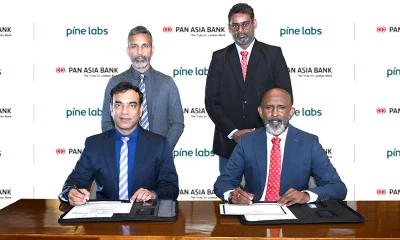
 Business6 days ago
Business6 days agoAPI-first card issuing and processing platform for Pan Asia Bank
-

 Business2 days ago
Business2 days agoHNB recognized among Top 10 Best Employers of 2025 at the EFC National Best Employer Awards
-

 Business2 days ago
Business2 days agoGREAT 2025–2030: Sri Lanka’s Green ambition meets a grid reality check
-

 Editorial4 days ago
Editorial4 days agoAll’s not well that ends well?
-

 Features4 days ago
Features4 days agoPhew! The heat …


